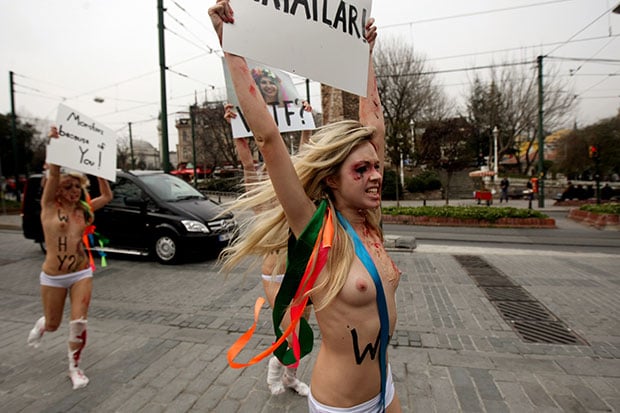Every Femen protest unfolds the same way. An unmarked van pulls into a public square, and a group of svelte, topless women emerge with flowers in their hair, breasts bare except for the painted slogans: “Freedom For Women,” “No Political Rape,” “Pope No More.” They shout and hold up signs. Sometimes they break things. But they are invariably dragged away by police, kicking and screaming.
The 2013 documentary Ukraine Is Not a Brothel goes behind the scenes of Femen, offering a candid and complex look into the private motivations of its members. Since the organization’s founding in 2008, Femen has evolved into a global media sensation, with activists waging “topless jihad” in England, Turkey, the United States, and beyond.
In her feature-film debut, director Kitty Green gets startlingly close to her subjects, catching glimpses of bruised knees, painted toenails, and clutched teddy bears that reveal more than Femen’s battle attire. Her interviews linger just long enough in silence to extract the truth lurking behind each rehearsed sound bite. With no narration or intertitles to orient the viewer, the documentary uncoils like a dramatic thriller—one that raises more questions than it answers.
The women of Femen call themselves “sextremists” and, more controversially, feminists. Inna and Alexandra, two of Femen’s most visible members, explain that they are fighting the post-Soviet sex trade, showing the world that Ukraine is a “country where naked girls protest, not sell their bodies.”
“Nobody takes a woman seriously, but everyone wants to look at women,” Inna says. That’s why they use their bodies, pale and statuesque, to send the message.
In spite of these noble intentions, the reality of Femen’s work is far more complicated. When the women are not picketing outside civic buildings and accosting heads of state, they are shilling for lingerie brands and posing for high-glamour photo shoots. One former member, Irina, reveals that Femen did not protest topless in its early years. She left the organization when nudity became part of its platform, when Femen sacrificed “girls who don’t have the figure” to promote its sexy, provocative “brand.”
Seen in this light, the protests begin to look more routine, like intricately choreographed publicity stunts. One particularly shocking demonstration centers on an overweight woman in a G-string—the “sex bomb”—while her thinner comrades, fully clothed for once, shout “Danger! Danger!” around her. Initially the woman says she is proud of her contribution to the cause but admits, in the end, that the others “position themselves” as feminists but see her only as the butt of a joke.
Meanwhile, in scene after scene, Femen members receive calls and instructions from a man named Victor, who looms over the operation like a disembodied Charlie—and over time, the women chafe under his leadership. Victor’s role in Femen isn’t explored until the film’s climax, a tense, no-holds-barred interview with the patriarch at the head of this antipatriarchal movement.
Still, the film eschews any facile conclusions about Femen. Women who appear ditzy or naive in one instant expound eloquently on gender politics the next. Rightly or wrongly, the group’s tactics draw attention to feminism around the world—and throw the protesters’ lives into very real peril. Whether Femen fights exploitation or exploits its own members, whether it is a feminist movement or an elaborate form of self-delusion, it has given all these women a sense of purpose in life.
Screening Saturday, June 21, 9 PM at Goethe-Institut.
Return to AFI Docs page.


















